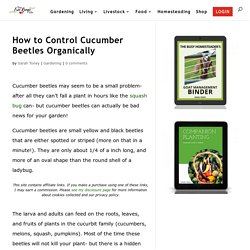

How to Grow Squash: Tips & Tricks. For the best results when growing squash, plant squash seeds directly into the ground at least a week after your last frost date.

You can use a planting calendar to determine the exact planting date for your location. Alternately, you can start the seeds indoors, sowing them two weeks to a month before your last spring frost. When planting outdoors, whether from seeds or seedlings, choose a spot with full sun and well-draining soil. Depending on where you live, you may need to put gopher wire or baskets under the plants before planting or to create some kind of fencing to protect your crop from rabbits, deer, or other wild critters. If the weather gets nippy, with the temperature dipping close to freezing, you can protect the soil and young plants with a cold frame, a clear glass jar, or half a plastic bottle on top. Make inch-deep holes and drop two seeds in each hole to maximize the chances of growing plants from those seeds (not all seeds are viable).
Leaf Miners: How to Prevent and Get Rid of These Pests from Your Garden. 6 Chemical-Free Gardening Techniques for a Healthy, Natural Garden. MorningChores - Build Your Self-Sufficient Life. Companion Planting - Urban Farmer Seeds. Growing Tomatoes - The Ultimate Guide To Growing Tomato Plants. Gardening Know How - Gardening Is Easy! Let us Show You How. Starting COLD HARDY VEGETABLES Super Early « giantveggiegardener.
So now that the Persephone period is almost over and the magic date of January 15th is upon us, what does that mean?

It means our day lengths are getting longer and January 15th is when we start getting 10 hours of daylight that will continue to get longer every day. Have you noticed already it now gets dark around 5:30 instead of 5 pm? The darkest time of the year is over. What does that mean to gardeners? To learn how to start cold hardy vegetable seeds super early outside and how also how to start them inside read on. If you want to try growing cold hardy vegetables outdoors at this time of year, you will need a cold frame, low tunnel or hoop house. If you already planted cold hardy vegetables late last fall in a cold frame, low tunnel or hoop house, you may have noticed that the little seedlings haven’t been growing much at all as winter set in. STARTING VEGETABLE SEEDS INSIDE:I’ve already written about starting seeds inside on many earlier posts. Arugula-Astro, Sylvetta claytonia. Giantveggiegardener « —an artisan farmer's journey. Swiss Chard Problems - Learn About Common Problems With Swiss Chard.
Swiss chard is generally a trouble-free veggie, but this cousin to the beet plant can sometimes fall prey to certain pests and diseases.

Read on to learn about common problems with Swiss chard, and explore possible solutions that may save the huge, nutritious, flavor-rich leaves. Fungal Trouble with Swiss Chard Fungal Swiss chard diseases are the most common culprits responsible when your plants fall ill in the garden. Cercospora Leaf Spot – This fungal disease tends to affect lower leaves first. It is recognized by brownish-grey or black spots with reddish-purple halos.
Downy mildew – Humid conditions or excess moisture may result in downy mildew, a fungal disease that is unsightly but usually not deadly. To prevent and treat fungal Swiss chard diseases, leave plenty of space between plants to provide adequate air circulation. If more aggressive treatment is required, use a fungicide containing copper. Gardening Know How - Gardening Is Easy! Let us Show You How. Common Swiss Chard Diseases - How To Treat Diseased Swiss Chard Plants. Swiss chard diseases are not numerous, but just one of them can wipe out your crop for the year.

But, if you know about these diseases and pests, you can take steps to prevent or treat them and save your harvest. Preventing Swiss Chard Diseases Infections are more likely to spread and take root when plants are close together, so give your chard plenty of space. One plant should not be touching another. Chard likes moisture and will taste bad after a drought, but standing water can increase the chances of infection.
How to Control Cucumber Beetles Organically. Cucumber beetles may seem to be a small problem- after all they can’t fall a plant in hours like the squash bug can- but cucumber beetles can actually be bad news for your garden!

Cucumber beetles are small yellow and black beetles that are either spotted or striped (more on that in a minute!). They are only about 1/4 of a inch long, and more of an oval shape than the round shell of a ladybug. This site contains affiliate links. If you make a purchase using one of these links, I may earn a commission. Please see my disclosure page for more information about cookies collected and our privacy policy.
The larva and adults can feed on the roots, leaves, and fruits of plants in the cucurbit family (cucumbers, melons, squash, pumpkins). Striped Cucumber Beetles vs. There are 2 types of cucumber beetles. Spotted cucumber beetles aren’t as picky when it comes to their diet and will feed on a variety of plants. 6 Ways to Get Rid of Squash Bugs in Your Garden- Naturally! Are squash bugs destroying your garden?

Here’s how to get rid of squash bugs naturally in your organic garden! Squash bugs are one of the hardest pests to get rid of once they find your garden. It can be devastating to walk out to your garden and find your beautiful squash plants wilted on the ground. And all those dreams of a big squash crop this year are gone. This site contains affiliate links. Crop rotation is helpful, but only if you have a lot of room to rotate about.
How to Control Cucumber Beetles Organically. Gardening Know How - Gardening Is Easy! Let us Show You How. The Best Companion Plants for Cucumbers in the Backyard Garden. Companion planting with your cucumbers can help your garden grow better, taste better, and have less problems with pests.
